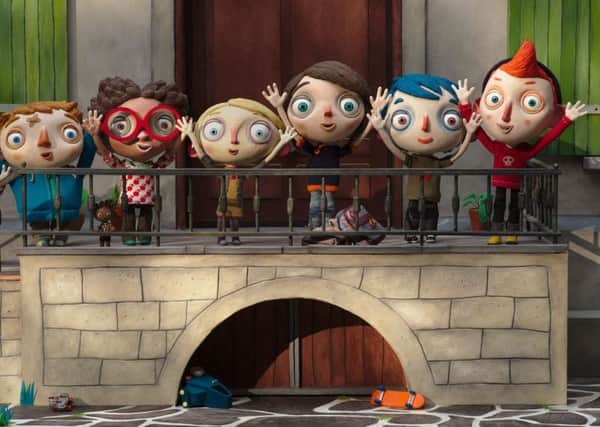Film reviews: My Life as a Courgette | Baywatch | After the Storm | It Was 50 Years Ago Today!


My Life as a Courgette (PG) *****
Baywatch (15) **
After the Storm (PG) ***
It Was 50 Years Ago Today! The Beatles: Sergeant Pepper and Beyond (12A) *
Oscar-nominated this year for best animated feature, My Life As a Courgette is one of those rare family films that trusts audiences of all ages to connect with its characters and (somewhat heavy) themes without overloading the story with exhausting action sequences, pop-culture gags or punch-pulling emotional beats. Directed by Swiss animator Claude Barras, it’s a tender and heartbreaking portrait of childhood, but a hopeful one too, beautifully adapted by screenwriter Céline Sciamma from Gilles Paris’s novel of (almost) the same name.
Advertisement
Hide AdSciamma is best known as the director of Girlhood and Tomboy, both remarkable evocations of adolescence that resonate precisely because of how truthfully they explore and represent the dilemmas of their young protagonists. Here she brings a wonderfully judged sensitivity and wit to a delicate tale of childhood resilience in the face of potentially traumatic events, qualities that perfectly complement Barras’s simple yet expressive stop-motion style.
Its hero is a neglected boy who has been nicknamed Courgette by his alcoholic mother. Her accidental death early in the film results in him being sent to an orphanage, where he meets a band of misfits with similarly troubled histories.
Reminiscent of Coraline and Wes Anderson’s Fantastic Mr Fox, but full of its own idiosyncrasies, the film has a very light touch in its treatment of all of this: it understands how to capture the anxiety of childhood, but also its vibrancy and its joys without coddling children (or over-sensitive parents). Subtitled and dubbed versions (the latter featuring Ellen Page and Nick Offerman) are on release. Both are great.
With Baywatch, the eternally cheesy 1990s teatime telly show gets a 21 Jump Street-style reboot – minus Jump Street’s sharp script, adroit casting and mastery of tone. Instead it casts Dwayne Johnson in the David Hasselhoff role and Zac Efron as the cocky new recruit to his team of body-conscious lifeguards, whose inflated sense of their own crime-fighting responsibilities brings them into conflict with their boss, a ruthless drug syndicate and local law enforcement. That they’re not really cops is the running (and not very good) central joke of the film, though Baywatch does drift along for a while on the back of Johnson’s outsized personality and benefits from his ability to generate a few laughs with a steady stream of belittling nicknames directed towards Efron’s character, a disgraced Olympic swimmer trying to redeem himself after his drunken antics cost him his career. Mostly, though, the film falls back on f-bombs and vomit gags, and when those don’t work, it subjects the film’s token nerd (Jon Bass) to all manner of sexual humiliations as he tries to impress swimsuit model-turned-actress Kelly Rohrbach, cast here as a substitute for Pamela Anderson. The film doesn’t really know what to do with its source material either, half-heartedly calling out the show’s casual sexism, but clearly unsure of how familiar modern audiences are with its slow-mo leeriness or, indeed, its original stars. Cameos from the Hoff and Anderson function like concrete armbands.
Japanese director Koreeda Horikazu follows up last year’s wondrous Our Little Sister with another carefully observed, quietly compelling drama about the fractious nature of families when life hasn’t quite panned out as hoped. After the Storm casts Koreeda regular Abe Hiroshi as Ryota, a once-promising novelist who’s sliding into middle age having failed to follow through on his potential. Languishing in a self-pitying funk of his own creation, he’s working as a private detective, extorting money where he can, unwilling to admit that this is his job rather than “research” for a future opus. Plagued with gambling debts and unable to pay child support to his ex-wife, Kyoko (Maki Yoko), he supplements his once-a-month visitation rights by spying on her and his young son, Shingo (Yoshizawa Taiyo). Koreeda uses this set-up to explore the peculiarly male habit of living in the past to the detriment of the present and surrounds his protagonist with no-nonsense women – his ex, his mother, his sister – to better reinforce the self-destructive effect of his own narcissism: they no longer need him; in fact, he’s more of a drain on them than they ever were on him or his (thwarted) ambitions. Though the titular storm is a long time coming, Koreeda mines its metaphorical import for all it’s worth, stranding Ryoto with his family in order to make him face up to a few home truths. But the way the film continues to surprise in small, detailed ways, rejecting an easy Hollywood-style redemption ending for something more ambiguous and believably human, is what makes it linger.
The anniversary this week of The Beatles’ most significant album gets a barrel-scraping tribute courtesy of a new documentary that offers no direct access to surviving members or even any of their music or images. The clumsily titled It Was 50 Years Ago Today! The Beatles: Sgt. Pepper and Beyond instead pulls together a few biographers, hangers-on and peripheral figures from the Mersey Beat and Apple days to trot out well-worn stories or second-hand anecdotes detailing John, Paul, George and Ringo’s transition from touring pop band to serious studio artists. Any self-respecting fan will know most of this already and without the music to illustrate the story, newcomers might be left wondering what all the fuss is about. ■